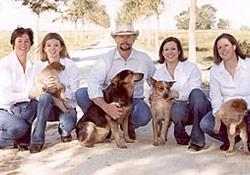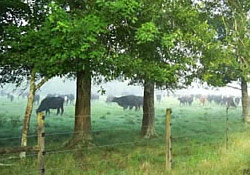 White Oak Pastures, a 1000-acre farm in Early County, Georgia, was founded by James Edward Harris in 1866 following his Civil War service as a Captain. He and the 100 sharecroppers who worked on the farm raised crops, cows and pigs. Every Saturday, a cow and several pigs were harvested to feed his family and the workers.
White Oak Pastures, a 1000-acre farm in Early County, Georgia, was founded by James Edward Harris in 1866 following his Civil War service as a Captain. He and the 100 sharecroppers who worked on the farm raised crops, cows and pigs. Every Saturday, a cow and several pigs were harvested to feed his family and the workers.
By the early part of the 20th century, when James’s son, Will, ran the farm, White Oak Pastures was harvesting cows and pigs every morning, six days a week. The meat was loaded on a mule-drawn wagon and hauled three miles up a dirt road to the town of Bluffton, where it was delivered to four general stores, a hotel and a boarding house.
Will Harris III, the fifth generation of Harisses to run the farm, says, “Our farm was the entity that produced local food for families that lived on the farm and the surrounding communities.” But that changed after World War II, when the Harrises joined the agriculturalindustrial revolution and began raising only calves, using growth-promoting hormones, antibiotics and high-grain feeds. The cattle were sent out West to be fed and then shipped all over the world.

“Now, we’re going back to the way my granddaddy raised cattle,” said Harris. “We decided that consumers should be able to eat simple, natural, healthy beef that is raised the old-fashioned way.”
Harris and his family keep 650 “mama cows,” a bigger herd than his grandfather raised, but otherwise reflecting the same philosophy. “We’re back to producing food for a more local community. The cattle are once again being raised on Southern sunshine, unpolluted country air and the native grasses that grow in the fertile coastal soil of southwest Georgia.”
While his wife teaches school and one daughter, Jenni,18, is away at college, his 22-year-old daughter, Jessica, also a schoolteacher, keeps the books and manages the office at the farm. Jodi, age 15, is the family cowgirl, who loves working with the horses and cattle. His grandmother, Eloise, 85, still lives on the farm and makes lunch for the crew every day.
 Fortunately for Harris, his cattle’s clean-living lifestyle is increasingly popular with consumers, too. His White Oak Pastures Natural Ground Beef already has a following, with distribution in supermarkets in Atlanta and natural foods stores throughout the Southeastern U.S. from Miami to Washington, D.C.
Fortunately for Harris, his cattle’s clean-living lifestyle is increasingly popular with consumers, too. His White Oak Pastures Natural Ground Beef already has a following, with distribution in supermarkets in Atlanta and natural foods stores throughout the Southeastern U.S. from Miami to Washington, D.C.
White Oak Pastures sells only high-quality ground beef that is derived from premium cuts — the loin, rib eye and sirloin. Grassfed beef is high in Omega 3 fatty acids and other nutrients.Harris believes he has found a niche among consumers who like the hearty taste, health benefits and sustainable farming practices inherent in raising grass-fed cattle.
“We do the right thing for our animals and for the soil and water on our land. We raise our beef for food safety, for its health benefits and, of course, for flavor,” said Harris.
To learn more, visit their website at: White Oak Pastures
For information on where to find other Certified Humane® products in your area, visit the “Shop” page of HFAC’s website.




White Oak Pastures
Posted: February 4, 2014 by Certified Humane®
By the early part of the 20th century, when James’s son, Will, ran the farm, White Oak Pastures was harvesting cows and pigs every morning, six days a week. The meat was loaded on a mule-drawn wagon and hauled three miles up a dirt road to the town of Bluffton, where it was delivered to four general stores, a hotel and a boarding house.
Will Harris III, the fifth generation of Harisses to run the farm, says, “Our farm was the entity that produced local food for families that lived on the farm and the surrounding communities.” But that changed after World War II, when the Harrises joined the agriculturalindustrial revolution and began raising only calves, using growth-promoting hormones, antibiotics and high-grain feeds. The cattle were sent out West to be fed and then shipped all over the world.

“Now, we’re going back to the way my granddaddy raised cattle,” said Harris. “We decided that consumers should be able to eat simple, natural, healthy beef that is raised the old-fashioned way.”
Harris and his family keep 650 “mama cows,” a bigger herd than his grandfather raised, but otherwise reflecting the same philosophy. “We’re back to producing food for a more local community. The cattle are once again being raised on Southern sunshine, unpolluted country air and the native grasses that grow in the fertile coastal soil of southwest Georgia.”
While his wife teaches school and one daughter, Jenni,18, is away at college, his 22-year-old daughter, Jessica, also a schoolteacher, keeps the books and manages the office at the farm. Jodi, age 15, is the family cowgirl, who loves working with the horses and cattle. His grandmother, Eloise, 85, still lives on the farm and makes lunch for the crew every day.
White Oak Pastures sells only high-quality ground beef that is derived from premium cuts — the loin, rib eye and sirloin. Grassfed beef is high in Omega 3 fatty acids and other nutrients.Harris believes he has found a niche among consumers who like the hearty taste, health benefits and sustainable farming practices inherent in raising grass-fed cattle.
“We do the right thing for our animals and for the soil and water on our land. We raise our beef for food safety, for its health benefits and, of course, for flavor,” said Harris.
To learn more, visit their website at: White Oak Pastures
For information on where to find other Certified Humane® products in your area, visit the “Shop” page of HFAC’s website.
Category: Legacy